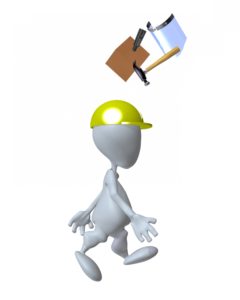The force of gravity is something we all take for granted; but do you know what would happen if it suddenly switched off? According to Jolene Creighton, writing for the website ‘Futurism.com’, everything that is not attached to the earth would literally float off into space, including earth’s atmosphere, oceans, rivers, and if you are not, so would you. And given enough time, the earth itself would break up and drift off into the abyss . I don’t know about you, but even though gravity has its drawbacks, I wouldn’t want to lose it; the idea of floating endlessly into space isn’t particularly appealing.
Back on earth now; one of the obvious downsides of gravity is that items fall, often when we don’t want them to. And sometimes those falling objects can cause serious injuries, or even worse, to anyone unfortunate to be below them.
A moment of complacency can have devastating effects
There are many examples of workers who have been seriously injured by falling objects across a wide range of industries. Some of the more serious cases cited and investigated by the health and safety executive (HSE) include a 66-year-old man who was fatally crushed after a pallet of bottles fell onto him from a vehicle tail-lift. And in another case, a man was crushed by a digger that he was trying to load onto a trailer. In both of these cases, there was an obvious lack of consideration for safe working practices – something that is truly unacceptable in the modern workplace.
Falling objects can cause serious injuries in any sector. Some of the more common scenarios include:
- Stock falling from a warehouse shelf onto workers below
- Tools or building materials which are not sufficiently secure falling from construction scaffolding
- Overloaded fork-lift trucks, cranes, hoists, or other weight-bearing equipment, which cause items fall
- Poorly fitted or maintained work premises, which can cause fixtures and fittings to fall onto workers below

And don’t think that because you work in an office, you are immune from falling objects. You have the risk of toppling drawer units, objects falling from tall furniture, and overloaded shelves to contend with.
Protecting workers from falling objects
Under the Work at Height Regulations 2005, employers have a legal duty to:
- Where necessary to prevent injury to any person, take suitable and sufficient steps to prevent, so far as is reasonably practicable, the fall of any material or object.
- Where it is not reasonably practicable to comply with the requirements of paragraph (1), every employer shall take suitable and sufficient steps to prevent any person being struck by any falling material or object which is liable to cause personal injury.
- Ensure that no material or object is thrown or tipped from height in circumstances where it is liable to cause injury to any person.
- Ensure that materials and objects are stored in such a way as to prevent risk to any person arising from the collapse, overturning or unintended movement of such materials or objects.
Keeping workers safe from falling objects requires a two-pronged approach – prevention and protection. In practice, even very simple measures can prove highly effective in keeping workers safe from falling items including:
- Securing all tools when used at height – tethering devices are one way to achieve this
- Ensure stacked items are secure – use plastic wrapping on pallets and ensure shelving is not overloaded. Also place lighter objects at height and heavier objects on lower shelves
- Use physical protection to avoid objects falling – such as toe boards, guardrails, debris nets
- Implement exclusion zones to prevent workers from entering areas which may pose a falling object risk
- Personal protective equipment (PPE) – especially hardhats
- Ensure raised floors and mezzanines are designed to take the weight required
- Ensure that workers understand the load capacity of lifting equipment
- Implement thorough and consistent training and signage to prevent falling objects
And beyond all of the measures to protect to workers, it is imperative that any accidents that do occur are documented in a formal accident book, and also reported to HSE in accordance with Reporting of Injuries, Diseases and Dangerous Occurrences Regulations 2013 (RIDDOR).
Claiming compensation if you are injured by a falling object
Workplace injury compensation is specifically intended to help those who have been the victim of a serious accident at work, that was caused by the negligence of the employer. In most cases it is the employer’s insurance company that will foot the cost of the compensation you receive; therefore, you should never feel that the claim may prejudice your position at work; your employer is prepared and covered for such an eventuality. If you have suffered physical, emotional, and/or financial loss as a result of an accident that was not your fault, any money you receive can be used to regain your health and put your finances back in order. And because we take clients on a no-win-no-fee basis, you can be confident that you will not be required to pay if your claim is not successful.
At Russell Worth Solicitors we specialise in personal injury claims. If you have suffered a workplace injury and would like a free claim assessment, please call us now on 0800 028 2060 or complete our Online Claim Assessment.

